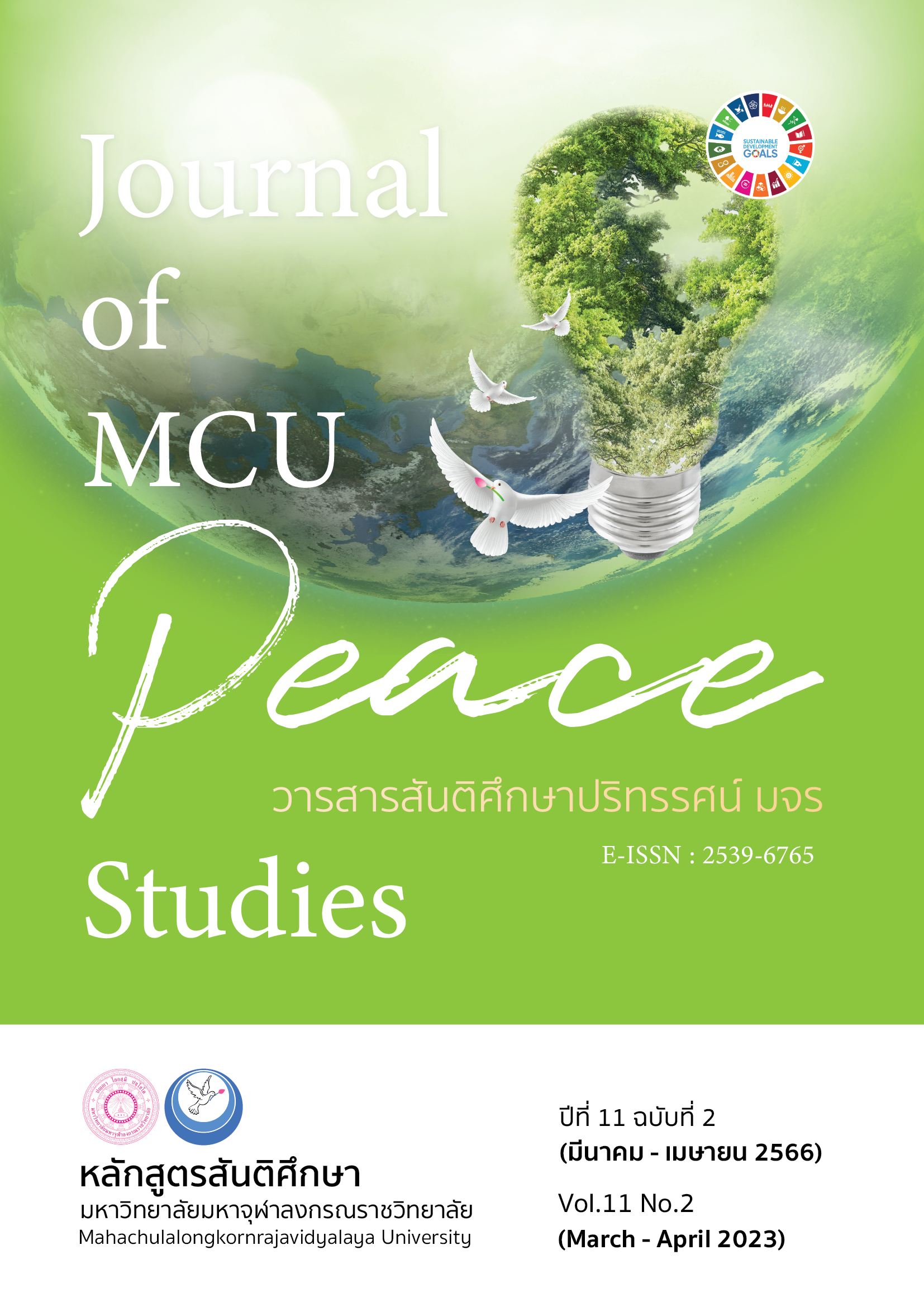การพัฒนากลยุทธ์การบริหารสถานศึกษาสู่โรงเรียนมาตรฐานสากล
Main Article Content
บทคัดย่อ
บทความวิจัยนี้มีวัตถุประสงค์เพื่อ 1) ศึกษาสภาพปัจจุบันและสภาพที่คาดหวังของการบริหารสถานศึกษาสู่โรงเรียนมาตรฐานสากล 2) พัฒนากลยุทธ์การบริหารสถานศึกษาสู่โรงเรียนมาตรฐานสากล 3) ประเมินกลยุทธ์การบริหารสถานศึกษาสู่โรงเรียนมาตรฐานสากล กลุ่มตัวอย่างประกอบด้วย ผู้บริหารโรงเรียนมาตรฐานสากล ครูหัวหน้าวิชาการและครู จำนวนทั้งสิ้น 608 คน โดยการวิจัยในครั้งนี้ใช้วิธีการวิจัยเชิงปริมาณและคุณภาพ เครื่องมือที่ใช้ในการวิจัย คือ แบบสัมภาษณ์แบบมีโครงสร้าง แบบสอบถามซึ่งมีค่าความเที่ยงของแบบสอบถามเท่ากับ 0.99 การวิเคราะห์ข้อมูลใช้การวิเคราะห์เนื้อหา สถิติที่ใช้ในการวิเคราะห์ข้อมูล ได้แก่ ค่าร้อยละ ค่าเฉลี่ย ส่วนเบี่ยงเบนมาตรฐานและค่าดัชนีความต้องการจำเป็น (PNIModified) มีการตรวจสอบกลยุทธ์โดยการวิเคราะห์เนื้อหาจากวิธีการสัมมนาอิงผู้เชี่ยวชาญ
ผลการวิจัยพบว่า 1. สภาพปัจจุบันโดยภาพรวมอยู่ในระดับมาก ( = 3.79) โดยด้านที่มีค่าเฉลี่ยสูงสุด คือ ด้านการวัด การวิเคราะห์และการจัดการความรู้ (
=3.83) ด้านที่มีค่าเฉลี่ยต่ำสุดคือ ด้านปฏิบัติการ (
=3.76) สภาพที่คาดหวังของการบริหารสถานศึกษาสู่โรงเรียนมาตรฐานสากลโดยรวมอยู่ในระดับมากที่สุด (
= 4..62) เมื่อพิจารณาจากค่าความต้องการจำเป็นพบว่า ด้านที่มีค่าความต้องการจำเป็นจากสูงสุด คือ ด้านบุคลากร (PNIModified=0.24) และที่มีค่าเฉลี่ยต่ำสุดคือ ด้านการวัด การวิเคราะห์และการจัดการความรู้ (PNIModified=0.19) 2. การพัฒนากลยุทธ์การบริหารสถานศึกษาสู่โรงเรียนมาตรฐานสากล มีกลยุทธ์หลักทั้งหมด 6 ด้าน ได้แก่ 1) ด้านการนำองค์กร 2) ด้านการวางแผนกลยุทธ์ 3) ด้านการมุ่งเน้นนักเรียนและผู้มีส่วนได้ส่วนเสีย 4) ด้านการวัดการวิเคราะห์และการจัดการความรู้ 5) ด้านบุคลากร และ 6) ด้านการปฏิบัติการ 3. ผลการประเมินกลยุทธ์การบริหารสถานศึกษาสู่โรงเรียนมาตรฐานสากลเป็นกลยุทธ์ที่มีความสอดคล้อง ความเหมาะสม ความเป็นไปได้และความเป็นประโยชน์ อยู่ในระดับมากที่สุด (
= 3.71)
Article Details

อนุญาตภายใต้เงื่อนไข Creative Commons Attribution-NonCommercial-NoDerivatives 4.0 International License.
ทัศนะและความคิดเห็นที่ปรากฏในบทความในวารสาร ถือเป็นความรับผิดชอบของผู้เขียนบทความนั้น และไม่ถือเป็นทัศนะและความรับผิดชอบของกองบรรณาธิการ ยินยอมว่าบทความเป็นลิขสิทธิ์ของวารสาร
เอกสารอ้างอิง
Bangroy, S. (2012). The Study to Deteltiline the Needs and Problems in Learning English in Preparation for ASEAN Community of Mathayomsuksa 3 in Education Expansion School in the Suratthani Primary Education Service Area 1. (Master’s Thesis). UbonRatchathani University. UbonRatchathani.
Chinnapong, S. (2017). Factors of Secondary School Administration with Quality System to World-Class Standard. (DoctoralDissertation). Nakhon Pathom Rajabhat University. Nakhon Pathom.
Kaewpanna, N. (2014). International Standard School English Learning Management Model under the Office of the Basic Education Commission, Ministry of Education. (Doctoral Dissertation). North Bangkok University. Bangkok.
Khongrat, N. (2015). Developing Operation Strategies to Upgrade the Quality of Municipality Schools Under Local Educational Group 18. (Doctoral Dissertation). Kamphaeng Phet University. Kamphaeng Phet.
Kongthawee, A. (2013). The Procedured Quality Administration Guidelines for World-Class Standard School of Wattanothaipayap School, Chiang Mai Province. (Master’s Thesis). Chiang Mai University. Chiang Mai.
Munkong, J. (2011). The Operation toward the Implementation Guidelines of World-Class Standard School. (Master’s Thesis). Silpakorn University. Bangkok.
Office of the Basic Education Commission. (2010). National Education Act. B.E. 2542 (1999) and Amendments Third National Education Act. B.E. 2553 (2010). Bangkok: Prime Minister's Office.
Plexico, C. (2008). Global Trends Necessitating a World Class Education. (Doctoral Dissertation). Auburn University. USA.
Pudyen, B. (2015). The Development of Management Strategies of the World-class Standard Elementary Schools towards Thailand Quality Award. (Doctoral Dissertation). Sripatum University. Bangkok.
Rattanalerd, W. (2020). A Study of Conditions and Operational Guidelines to Promote, Support and Develop School Quality System Management with International Standards under the Secondary Educational Service Area Office 16. The Secondary Educational Service Area 16 Office: Supervision, Monitoring and Evaluation for Educational Pro.
Scanlan, M., & Lopez, F. (2012). How School Leaders Promote Equity and Excellence for Bilingual Students. Retrieved November 26, 2019, from http://www.sagepub.com/journalsPermissions
Siriwan, D. (2012). Guidelines for Implementing International Standard School Policies into Practice in Educational Institutions Elementary School under the Office of the Basic Education Commission. (Doctoral Dissertation). Kasetsart University. Bangkok.
Sripraiwan, R. (2012). The Development of Management Strategies towards Excellence of the Worldclass-Standard Elementary Schools. (Doctoral Dissertation). Chulalongkorn University. Bangkok.
Thaochalee, W. (2013). The Efficiency of School Administration Related to the World Class Standard School of Swcondary Schools in the Northeastern Region. (Doctoral Dissertation). Silpakorn University. Bangkok.
Thongkam, M. (2015). Quality Management System in World-Class Standard Schools under the Jurisdiction of Secondary Educational Service Area Office 9. (Master’s Thesis). Nakhon Pathom Rajabhat University. Nakhon Pathom.
Wilson, J.M. (2006). Leadership Trapeze: Strategies for Leadership in Team-Based Organizations. San Francisco: Jossey-Bass.
Yot-on, W. (2012). The Study of School’s Curriculum Management in World Class Standard School in Nakhon Sawan Province. (Master’s Thesis). Burapha University. Chonburi.


